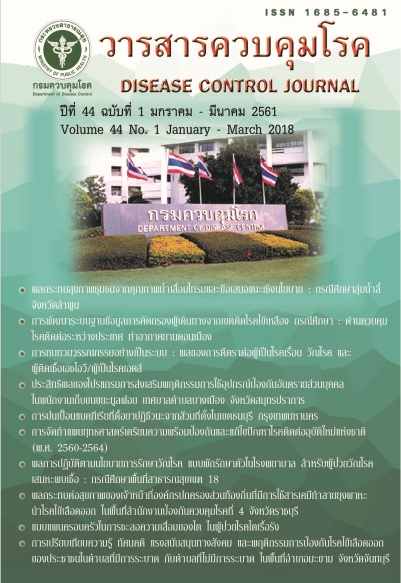Health impact assessment for local authority staff from chemical exposure: case study Of DHF host management at Office of Disease Prevention and Control Region 4, Ratchaburi
DOI:
https://doi.org/10.14456/dcj.2018.8Keywords:
Health impact assessment, chemical usage, Dengue hemorrhagic fever, mosquito controlAbstract
Dengue fever is one of important disease. Disease prevention was performed by the roles of local authority staff and disease control more area. At least ninety percent of control technique is chemicals usage. Staff who expose to the used chemicals are risky on their health. This research aimed to investigate the chemicals usage among local authority staffs and their prevention, and find the relationship of influencing factors on their health effects. This research was designed as cross-sectional survey research. Multi-stage sampling technique was used to select samples and sample size. Six hundred and two staff was interviewed. Statistical approaches were descriptive statistics and Pearson correlation. The results indicated that majority staff were male (95.7%) with average age 41.6 years old, 5.4 years of working in DHF control. Approximately 50.2% has attended the mosquito chemical spraying. Deltamethrin was a major chemical with 82.9% and follow the chemical preparation as mentioned in the guideline (46.6%). In case of DHF patient was diagnosed, chemical was sprayed for 2 times for each found patient. Thirty nine per cent of staff sprayed chemicals 5 hours consecutively for each day, 31.2% has paused less than 30 minutes with 60.3%. Knowledge of staff was moderate level (47.0%). Training attendance was significant related to knowledge level with p<0.05. Behavior of staff on chemical use was moderate level (55.1%). Age and timing of spraying and training attendance are significant related to behavior of staff on chemical use and prevention performance (p<0.01). The staff has abnormal symptom after chemical use. The main found symptom was throat pain (44%). Age and timing of spraying were significant related to recognition symptoms after spraying with p<0.01. The results of the study use should be strictly regulated according to the Ministry of Health regulations. The staff responsible for chemical use should attend the training program before operations, code of practice for local administration should be launched, personal protective equipment for officers should be available and maintained in good condition and the annual health examination for officers should be regularly performed. To reduce the prevalence of dengue, chemical use is one approach; however, using an integrating approach among local people and responsible organizations should be taken into account.
Downloads
References
2. สำนักระบาดวิทยา กรมควบคุมโรค. สรุปรายงาน การเฝ้าระวังโรค ปี 2557. กรุงเทพมหานคร: ชุมนุมสหกรณ์การเกษตรแห่งประเทศไทย; 2558.
3. สำนักระบาดวิทยา กรมควบคุมโรค. สรุปรายงาน การเฝ้าระวังโรค ปี 2558. กรุงเทพมหานคร: ชุมนุมสหกรณ์การเกษตรแห่งประเทศไทย; 2559.
4. สุจิตรา นิมมานนิตย์. การติดเชื้อและปัจจัยเสี่ยง. ใน: สีวิกา แสงธาราทิพย์, บรรณาธิการ. โรคไข้เลือดออก ฉบับประเกียรณก. กรุงเทพมหานคร: ชุมชนสหกรณ์ การเกษตรแห่งประเทศไทย; 2545. หน้า 9-11.
5 สำนักโรคติดต่อนำโดยแมลง กรมควบคุมโรค. แนวทางการควบคุมโรคไข้เลือดออกสำหรับเจ้าหน้าที่สาธารณสุข. นนทบุรี: สำนักโรคติดต่อนำโดยแมลง กรมควบคุมโรค; 2553.
6. สำนักโรคติดต่อนำโดยแมลง กรมควบคุมโรค. คู่มือ การป้องกันและควบคุมโรคไข้เลือดออกสำหรับองค์กรปกครองส่วนท้องถิ่น. นนทบุรี: สำนักโรคติดต่อนำโดย แมลง กรมควบคุมโรค; 2551.
7. กองแก้ว ยะอูป, บุญเทียน อาสารินทร์, นางลักษณา หลายทวีวัฒน์. การสำรวจการใช้สารเคมีกำจัดแมลง พาหะนำโรคไข้เลือดออกขององค์กรปกครองส่วนท้องถิ่น ใน พื้นที่สำนักงานป้องกันควบคุมโรคที่ 6 จังหวัดขอนแก่น. ขอนแก่น: สำนักงานป้องกัน ควบคุมโรคที่ 6 จังหวัดขอนแก่น; 2549.
8. ศักดา ศรีนิเวศน์. ผลกระทบของสารเคมีกำจัดศัตรูพืชต่อสุขภาพ [อินเทอร์เน็ต]. [สืบค้นเมื่อ 9 มิ.ย. 2558]. แหล่งข้อมูล: onionkuune.blogspot.com/ 2012/07/blog-post_7089.html
9. ลักษณา ลือประเสริฐ. การใช้สารเคมีกำจัดแมลงในบ้านเรือน [อินเทอร์เน็ต]. [สืบค้นเมื่อ 9 มิ.ย. 2558]. แหล่งข้อมูล: webdb.dmsc.moph.go.th/ ifc_toxic/a_tx_1_001c.asp?info_id=384\
10. สมศักดิ์ วสาคารวะ. สารเคมีกำจัดแมลง. ใน: สีวิกา แสงธาราทิพย์, บรรณาธิการ. โรคไข้เลือดออกฉบับ ประเกียรณก. กรุงเทพมหานคร: ชุมชนสหกรณ์ การเกษตร แห่งประเทศไทย; 2545. หน้า 89-93.
11. สิริมา มงคลสัมฤทธิ์. ระบาดวิทยาพื้นฐานและวิธีการทางสถิติสำหรับการประเมินความเสี่ยงทางสุขภาพ. ใน: สมชัย นิจพานิช, บรรณาธิการ. การวิเคราะห์ความเสี่ยงทางสุขภาพสำหรับเจ้าหน้าที่สาธารณสุข. นนทบุรี: ศูนย์ปฏิบัติการเตรียมพร้อมตอบโต้ภาวะฉุกเฉินด้านการแพทย์และสาธารณสุข กรมควบคุมโรค; 2552.หน้า 17-33.
12. พิบูล อิสสระพันธุ์. สถานการณ์การเจ็บป่วยด้วยโรคจากสารกำจัดศัตรูพืชในประเทศไทย (2549- 2553). นนทบุรี: สำนักโรคจากการประกอบอาชีพและสิ่งแวดล้อม กรมควบคุมโรค; 2555.
13. World Health Organization. The WHO recom¬mended classification of pesticides by Hazard and guidelines to classification 2009. Geneva: World Health Organization; 2010.
14. Kumar S, Thomas A, Pillai MKK. Deltamethrin: promising mosquito control agent against adult stage of Aedes aegypti L. Asian Pac J Trop Med 2011;4:430-5.
15. ชวลิต สาทช้าง. ความรู้ ทัศนคติ และพฤติกรรมการป้องกันอันตรายจากการใช้สารเคมีในการควบคุมโรคไข้เลือดออกของทีมสุขภาพ อำเภอพร้าว จังหวัดเชียงใหม่. [การค้นคว้าแบบอิสระ สาธารณสุขศาสตรมหาบัณฑิต] เชียงใหม่: มหาวิทยาลัย เชียงใหม่; 2554. 107 หน้า.
16. พันธญาณี ไชยแก้ว. ความสัมพันธ์ระหว่างพฤติกรรมการใช้สารเคมีกำจัดศัตรูพืชกับสุขภาพของเกษตรเพาะปลูกในตำบลนครเจดีย์ อำเภอป่าซาง จังหวัดลำพูน(การค้นคว้าแบบอิสระ สาธารณสุขศาสตรมหาบัณฑิต). เชียงใหม่: มหาวิทยาลัยเชียงใหม่; 2551. 62 หน้า.
17 วราพันธุ์ พรวิเศษศิริกุล. ความสัมพันธ์พฤติกรรมการใช้สารเคมีป้องกันกำจัดศัตรูพืชกับระดับเอนไซม์ โคลีนเอสเตอเรสในเลือดเกษตรกร หมู่บ้านทุ่งแดง ตำบลโหล่งขอด อำเภอพร้าว จังหวัดเชียงใหม่ (การค้นคว้าแบบอิสระ สาธารณสุขศาสตรมหาบัณฑิต). เชียงใหม่: มหาวิทยาลัยเชียงใหม่; 2548. 70 หน้า.
18 วิชชาดา สิมลา. ปัจจัยที่มีความสัมพันธ์กับพฤติกรรมการป้องกันสารเคมีกำจัดศัตรูพืชของเกษตรกร ตำบลแหลมโตนด อำเภอควนขนุน จังหวัด พัทลุง. วารสารสาธารณสุขศาสตร์ 2555; 42:103-13.
19. Kedia SK, Palis FG. Health effects of pesticide exposure among Filipino rice farmers. The Applied Anthropologist 2008;28:40-59.
20. Ntow WJ, Gijzen HJ, Kelderman P, Drechsel P: Farmer perceptions and pesticide use practices in vegetable production in Ghana. Pest Manag Sci 2006;62:356-65.
Downloads
Published
How to Cite
Issue
Section
License
Articles published in the Disease Control Journal are considered as academic work, research or analysis of the personal opinion of the authors, not the opinion of the Thailand Department of Disease Control or editorial team. The authors must be responsible for their articles.






